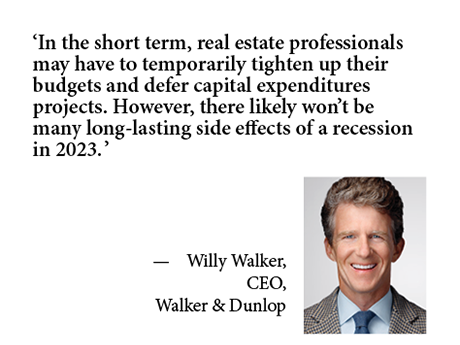By Willy Walker, CEO of Walker & Dunlop
Fed’s Recent Mistakes
In a recent Walker Webcast, “Most Insightful Hour in CRE with Dr. Peter Linneman” part of our ongoing webinar series, renowned economist Dr. Linneman and I discussed his views on monetary policy, inflation and what the economic and commercial real estate landscape looks like for 2023. Throughout the past year, the Federal Reserve has been raising the federal funds rate faster than we have ever seen. This, of course, has led to a drastic increase in the cost of borrowing, the likes of which haven’t been seen in decades.
In just one year, the effective federal funds rate has increased from 0.08 percent in February 2022, all the way to a target range of 4.5 to 4.75 percent in February 2023. This has led many to believe that the Fed has considerably overshot where rates should be since the market wasn’t given ample time to react to each rate hike.
This rapid increase in interest rates has reduced lending activity in terms of new loans, leading to a sharp decline in demand for real estate, as well as major price corrections. Additionally, the rapid rise in borrowing costs has also led to liquidity crises for many developers and investors who locked in floating-rate debt at the 2021 and early 2022 lows, as their debt obligations have been on the rise each month.
Is the Consumer Actually Faring Well?
A key piece of the commercial real estate puzzle is always the consumer. After all, the consumer keeps retail spaces, warehouses and offices full at the end of the day. Recently pundits have adopted the belief that the average consumer is in a bad place financially; however, that couldn’t be further from the truth, according to Dr. Linneman. He believes that the average consumer has a solid financial standing.
Oftentimes, those who believe the consumer is undercapitalized bring up the recent increase in consumer debt service payments and the decrease in household net worth. Although consumer debt service payments are rising and household net worth has fallen, it’s important to remember that the influx of stimulus in 2020 artificially tampered with these metrics.
As of the third quarter of 2022, consumer debt service payments are roughly flat compared to 2016-2019. Additionally, even though the household net worth is down 10 percent from the first-quarter 2022 highs, this metric is still near record highs. This means that the consumer is fairly well-capitalized and should remain resilient, even in the face of a potential recession.
How Might a Recession Affect Commercial Real Estate?
In the grand scheme of things, commercial real estate should remain largely unaffected by a 2023 recession. It’s important to remember that recessions are temporary, often lasting just six to eight months. As long as you have a long-term outlook on commercial real estate and you aren’t taking on excessive risk, a recession shouldn’t have much long-term impact.
In the short term, real estate professionals may have to temporarily tighten up their budgets and defer capital expenditures projects. However, there likely won’t be many long-lasting side effects of a recession in this year. This is especially true in the case of a potential 2023 recession, since the average consumer is still doing quite well.
Although those calling for a major recession in 2023 often refer to the hardships many experienced during the Great Financial Crisis of 2008, it’s unlikely a recession of this magnitude will occur.
The Outlook for 2023
Which way will interest rates move going forward? How will a potential recession affect commercial real estate? And most importantly, what does this mean for investors? Get the takeaways from our conversation by reading my full interview with Dr. Linneman or watching our webcast at https://explore.walkerdunlop.com/fm/article/feds-recent-mistake.
Walker & Dunlop is a content partner of REBusinessOnline. For more articles from and news about Walker & Dunlop, click here.


